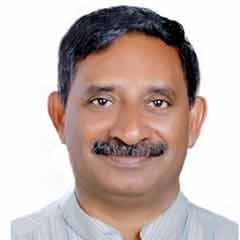After Modi, Narasimha Rao, Vajpayee & Jayalalithaa, TN man takes on Priyanka Gandhi for his 245th poll battle

Mail This Article
Kalpetta: What would you do after 244 unsuccessful attempts to win a general election? Call it a day, write a book on his opponents or speak on India's electoral system? Maybe, if you are a mere mortal.
But then, if you are K Padmarajan, 65, a native of Mettur near Coimbatore, Tamil Nadu, you would throw your hat in the ring one more time, 245th to be exact. This time, he has chosen Wayanad to be his battleground against Congress' Priyanka Gandhi, a year after he fielded himself against Rahul Gandhi.
Then again, the Gandhi scion is hardly the first celebrity he had contested against in his long electoral career. Starting in 1988, he had opposed former prime ministers P V Narasimha Rao and A B Vajpayee, current Prime Minister Narendra Modi, former Tamil Nadu chief minister and AIADMK supremo J Jayalalithaa. He claims he has spent more than Rs 1 crore as deposit money and other expenses. Undeterred, Padmarajan will kick off his campaign in Wayanad on Monday.
However, his almost four-decade electoral battles had bought him some fame in the form of an entry into the Limca Book of Records as the ‘Most Unsuccessful Candidate’. In his native village, Padmarajan is popular as the 'therthal mannan' (King of Elections).
What many don't know is that Padmarajan's roots are in Kannur in Kerala. His grandfather P Kelu Nambiar was from Payyannur and his favourite deity is "Sabarimala Ayyapa Swami".
A former homoeopath, he now earns income from a tyre repair and retreading shop at Mettur. Padmarajan told Onmanorama that each campaign is a celebration and that he enjoys celebratory status. “I enjoy seeking votes from people, sharing their joys and sorrows and instilling hope in them," he said.
He has grabbed the headline for his electoral adventures before. In 1991, soon after filing a nomination at Nandyal in Andhra Pradesh against P V Narasimha Rao, irate Congressmen kidnapped him as he had spoiled Rao's 'unopposed win' plan. "I was later let off in a remote place inside a jungle," Padmarajan said. For all his troubles, he captured 500 votes.
He had contested against many Congress leaders, except Rajiv Gandhi. “I am sad that I could not contest against Rajiv Gandhi”, he said.
In 1996, using an electoral law loophole, he filed nominations in five parliament constituencies spread over five states—Karnataka, Tamil Nadu, Andhra Pradesh, Kerala, and Pondicherry—and three assembly seats. He claims people like him were instrumental in introducing a poll law that limited the number of parliament constituencies that a candidate can contest simultaneously to two.
The 6,273 votes he polled in the Tamil Nadu Assembly election against R R Parthiban in 2011 was the maximum number of votes he received. He does not mind the highest or the lowest (0) number of votes he receives. Instead, he looks at the positives. "Nobody takes anything when we die. I enjoy this electoral life. Enjoying one’s life is very important”, he said. “To many, I am a joker, and even many of my close friends never waste their votes”, he said with a huge chuckle.
Padmarajan said he never spent more than a few lakh in expenses. “To cut down on costs, I used to limit my campaign only in major towns”, he said. "As per rules, I can spend up to Rs 95 lakh for a parliament election, but I used to less than that," he said.
In 1988, when he started his electoral battle, the security deposit was merely Rs 250 for state legislature and Rs 500 for parliament. That now stands at Rs 10,000 and Rs 25,000, respectively. He had also filed his nomination for the President's post but was rejected on scrutiny.
Padmarajan’s son, Sreejesh Padmarajan, also filed a nomination for the assembly election in Tamil Nadu. When the election officer refused to accept the nomination as the child was only three and half years old, Padmarajan told him he had no right to reject it at that point, but he could do that after scrutiny.
"Till my health permits me, I will continue to participate in elections," he said. “Every citizen can be a candidate, and that's our right," he reminded his fellow electors.


